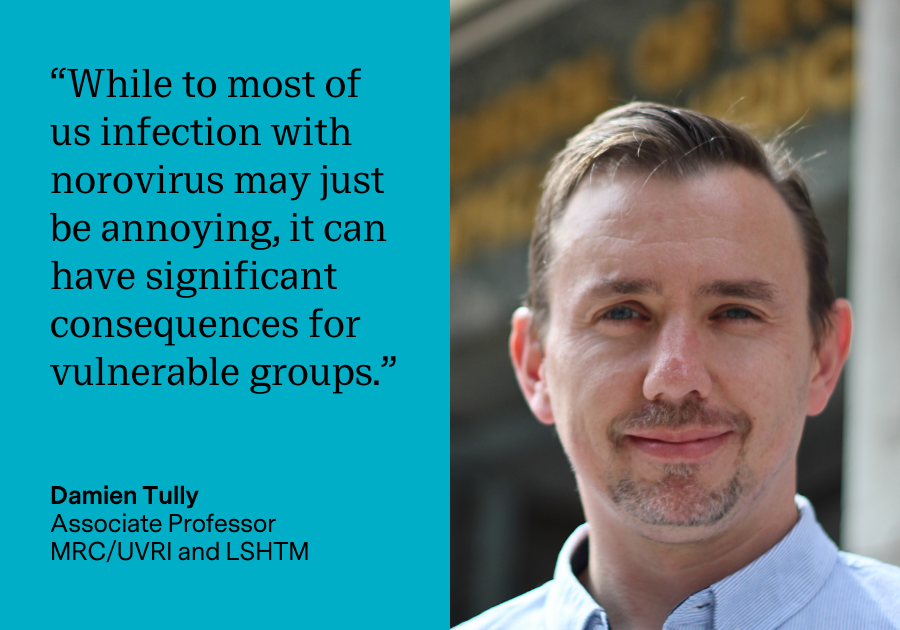Expert Comment – Why you could catch norovirus more than once this season
28 February 2025 London School of Hygiene & Tropical Medicine London School of Hygiene & Tropical Medicine https://lshtm.ac.uk/themes/custom/lshtm/images/lshtm-logo-black.png
"While to most of us infection with norovirus may just be annoying, it can have significant consequences for vulnerable groups." Damien Tully, Associate Professor, MRC/UVRI and LSHTM
People in the UK who have already had norovirus this season could still be at risk due to a shift in circulating strains, according to new data from the UK Health Security Agency (UKHSA).
Norovirus is a highly contagious stomach bug that is easily caught from someone else with the virus, or by touching infected surfaces or eating food that has been prepared by someone with it.
The latest data shows norovirus cases are continuing to rise. At the beginning of February 2025, cases were more than double the five-season average for the same two-week period and are the highest since detailed UKHSA reporting began.
The impact of the surge in cases is being seen the most in hospitals and care homes, with infections highest among people aged 65 and over.
Commenting on the situation, Dr Damien Tully, Associate Professor at the Medical Research Council/Uganda Virus Research Institute and London School of Hygiene & Tropical Medicine (MRC/UVRI and LSHTM) Uganda Research Unit, explained why two strains circulating at the same time are responsible for the increase in cases, and why it’s possible to catch both strains this season.
By researching the evolution and epidemiology of infectious diseases and how they interact with their hosts, Dr Tully and colleagues at LSHTM are working to uncover the clues to norovirus’s success, to help unlock the potential for a future vaccine.
Dr Tully said: “Since 2012, there has been one dominant norovirus variant circulating in the UK called GII.4. The surge in norovirus activity this season is due to a new variant of a different type of norovirus called GII.17 which, over the last seven years, has circulated at low levels and has only been responsible for around 1% of cases.
“Given the current variant’s low prevalence over past years, most people are susceptible to infection, which explains the huge surge in cases. Similarly, we know that infection with the variant that has previously caused the majority of cases (GII.4) will not confer any immunity to other strains of norovirus, so those who have experienced infection will still be susceptible to other strains.
“Reduced population immunity due to lower exposure during COVID-19 may have also created an environment where multiple strains can spread more easily.
“The second wave, while a cause for concern, should not be entirely surprising, as the GII.4 strain has dominated for over a decade and is a tough competitor. Time will tell if the new GII.17 variant can end GII.4’s 12-year reign as the dominant strain.
“The secret behind GII.17’s sudden success is still under investigation but through our research, we are continuing to find clues from the virus’s genome that may explain why it’s behaving differently. The new strain is evolving between three and six times faster compared to other GII.17 variants and changes to its structure may be affecting its ability to infect us.
“Uncovering the clues to norovirus’s success will help us unlock the potential for a vaccine, hopefully in the near future.
“There are several common 'mistakes' that can increase the risk of norovirus infections. As norovirus particles are extremely infectious, even at a low dose, improper handwashing especially after using the toilet or before handling food, can easily spread the virus.
“The best advice is to be diligent with hand washing with soap and warm water, as alcohol-based hand sanitisers or gels do not kill the virus. Norovirus can also survive on surfaces for days but bleach or other disinfectants are effective against it.
“People should also be aware that eating raw or undercooked shellfish such as oyster can increase the risk for norovirus. Oysters are filter feeders who take up norovirus as they filter seawater and if there is any potential wastewater contamination from humans there is an increased risk of illness. Carefully wash fruit and vegetables before preparing or eating them as norovirus is a leading cause of foodborne illness outbreaks.
“While to most of us infection with norovirus may just be annoying, it can have significant consequences for vulnerable groups, like the elderly, and for those whose job requires them to be in contact with many people a day, like healthcare workers. So any step you can take in preventing norovirus spread is important.”
If you enjoyed this article and would like to build a career in global health, we offer a range of MSc programmes covering health and data, infectious and tropical diseases, population health, and public health and policy.
Available on campus or online, including flexible study that works around your work and home life, be part of a global community at the UK's no.1 public health university.